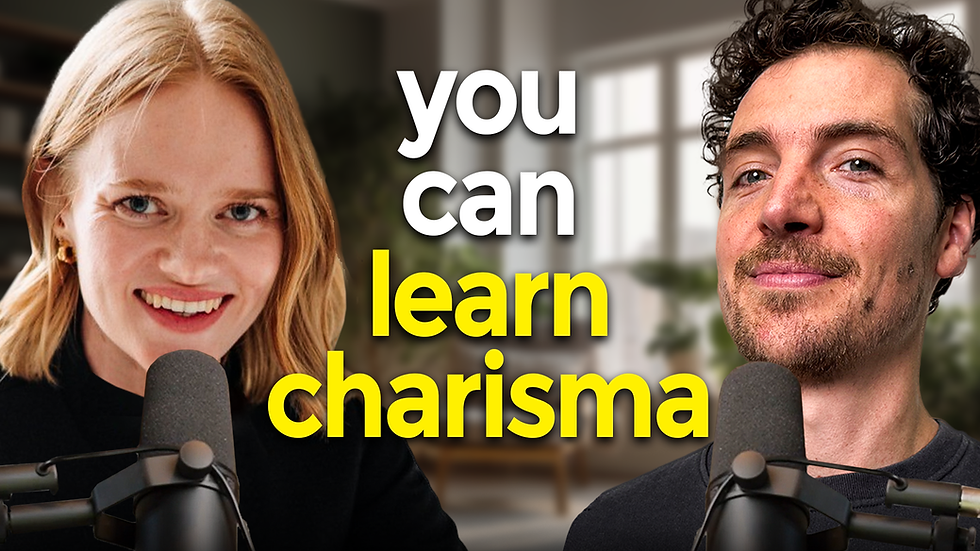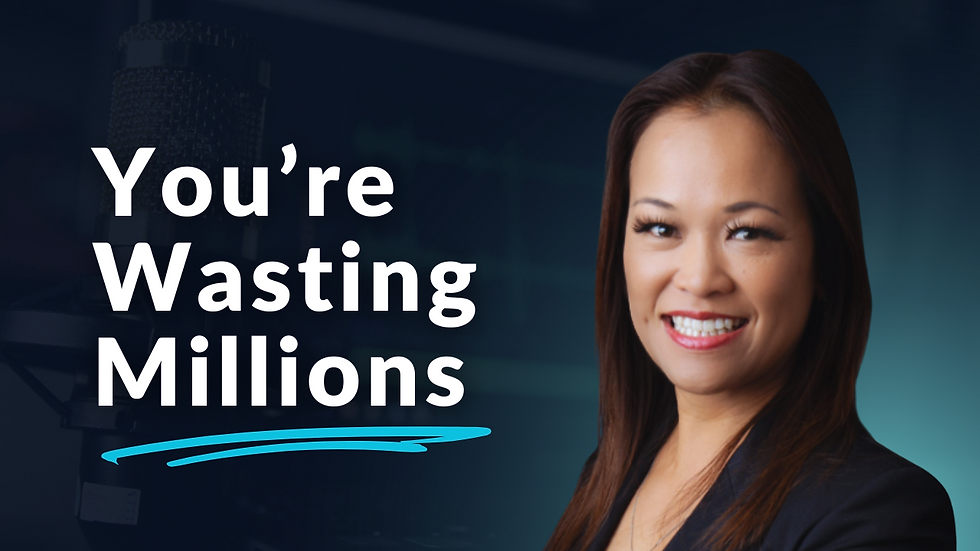From Awkward Analyst to Confident Presenter in 57 Minutes
- Gilbert Eijkelenboom

- Sep 3, 2025
- 7 min read
MindSpeaking Podcast Episode 34 - Alienor Hunter

🎙️Listen on your favorite channel:
🎧 Spotify
Highlights:
00:00 – Intro & guest background
01:13 – Childhood social anxiety story
04:53 – From analyst to coach
06:09 – Root cause of anxiety
09:57 – Building evidence to challenge fears
14:00 – Anticipation worse than speaking
16:09 – Going first builds confidence
17:54 – Speaking before thinking
21:45 – Small talk and spontaneity
25:47 – Power of pausing
29:41 – Pauses in data presentations
33:46 – Storytelling in business presentations
40:52 – Showing your personality
44:39 – Handling unexpected audience questions
56:05 – Final advice
Summary
In this episode, Gilbert speaks with Aliénor, a public speaking coach who transformed from a socially anxious teenager into a confident communicator. Together, they explore practical data storytelling techniques, how to engage non-technical audiences, and ways to build trust with stakeholders through effective communication. Aliénor shares her personal journey, from struggling with ordering coffee to coaching professionals on presenting data to stakeholders with confidence.
“Confidence is innate. You just have to unlock it.”
Introduction
🎙️ Gilbert Eijkelenboom
Aliénor, welcome to the podcast.
🗣 Aliénor Hunter
Thank you so much for having me—it’s a pleasure.
🎙️ Gilbert
You co-host public speaking programs and have helped many people go from anxious to confident. But not long ago, you were anxious yourself in social and speaking situations. Can we start there—take us back to moments where you really struggled?
Data Storytelling Techniques for Business
🗣 Aliénor
Absolutely. People now see me coaching at large companies and speaking on podcasts, but my journey began with fear. Around age ten, simple interactions felt huge. My mum would pull up at the supermarket and ask me to buy flour. Handing over two pounds and asking for a receipt felt intimidating.
As a teenager, everyday tasks—ordering a sandwich, booking a haircut, walking into a new shop—felt like mini-presentations with uncertain scripts. At university, it escalated. I’d stand outside a professor’s door, torn between knocking (scary) and not showing up (also scary). That constant catch-22 made life small.
At 18 or 19, I sought help for social anxiety. Weekly exercises helped: write down fearful thoughts, test them, then gather evidence for and against. Bit by bit, I learned my mind’s predictions were harsher than reality.
Fast forward five years: I became a data analyst at a tech startup. I thought I was “fixed.” Then my CEO asked me to present my data to clients. Saying “Hi, I’m Aliénor—here are my questions” felt overwhelming. I’d lose sleep, heart racing. I found UltraSpeaking, took the course, and it was transformational. Six months later I trained as a coach and shifted to public speaking full-time. Now my mission is to help others feel ease where I once felt fear.
Building Trust and Managing Stakeholder Expectations
🎙️ Gilbert
In those anxious moments—even the small ones—what sat beneath the fear?
🗣 Aliénor
I believed there was a right and wrong thing to say in every situation—and I didn’t know the script. I feared looking foolish: stumbling over words, someone joking at my expense, going red. At the core, it was fear of embarrassment and judgment.
Engaging Non-Technical Audiences with Data
🎙️ Gilbert
That’s relatable. Public speaking isn’t only stages of 50 people; it’s also micro-moments—asking a question, approaching someone at a bar, talking to a cashier. People are unpredictable; we can’t script them.
🎙️ Gilbert
You mentioned early coaching. What exercises helped most?
🗣 Aliénor
The biggest one was saying my thoughts out loud. My coach reflected my rigid rules back to me. For instance, when offered a drink at someone’s house, I’d always say “No, thank you” to avoid the risk of asking for something they didn’t have. Spoken aloud, my fear sounded exaggerated.
We also built an evidence log: predict what could go wrong → try the thing → record what actually happened. Over time, reality disproved the catastrophic predictions.
Avoiding Excessive Detail and Technical Language
🎙️ Gilbert
What steps helped you become more confident—especially for overthinkers?
🗣 Aliénor
Set small, brave challenges that fit your level: enter a new coffee shop, ask a question at a talk, or raise your hand first in a meeting. Note your assumption (“It’ll go terribly; everyone will laugh”) and compare it with the outcome. Repetition builds a positive feedback loop—your brain learns you’re safer than it thinks.
🎙️ Gilbert
I resonate. Confidence comes from action. I trained myself to set boundaries: in the train’s quiet zone, I’d ask noisy passengers to stop—even when it felt awkward. Most people responded fine; a few didn’t, and that was still okay. The growth came from acting, not reading 50 books.
🗣 Aliénor
Exactly. The hardest part is anticipation. Anxiety rises the longer you wait. If you defer until “I’ll speak last,” the pressure lingers—and sometimes you never speak, so you miss the positive feedback of “that went okay.”
🎙️ Gilbert
Going first reduces the energy drain—and builds evidence.
🗣 Aliénor
People think going last gives time to prepare and sound smarter. In reality, the incremental prep rarely beats the cost of sitting in cortisol for 30 minutes. Speak earlier; your future self will thank you.
Speaking Before You Think (Without Sounding Reckless)
🎙️ Gilbert
One UltraSpeaking idea many data professionals resist: speak before you think. It sounds backward.
🗣 Aliénor
Analysts are trained to think first. But overthinking sabotages delivery. You self-censor, miss the moment, and shrink. Our brains are excellent at completing thoughts on the fly. We train this with quick “analogy” games—two words appear; you connect them instantly. At first you feel nonsensical; quickly, you surprise yourself with coherence. Confidence grows because you stop judging every sentence.
If you do misspeak, correct it and move on. Recovery is a core skill—vital for effective stakeholder communication and gaining stakeholder buy-in.
Using Pauses to Land Business-Focused Data Insights
🎙️ Gilbert
Let’s talk pauses and filler words.
🗣 Aliénor
“Pause more” is the top Google tip—but knowing it isn’t doing it. People avoid pausing because they fear going blank, being interrupted, or looking unprepared. We train long, deliberate pauses (UltraSpeaking’s Snow Globe game) to prove nothing catastrophic happens.
Pauses help you choose the next idea rather than ramble. They boost impact and calm you down.
🎙️ Gilbert
Silence often surfaces unexpected insights—if we trust it.
🗣 Aliénor
Yes. The first thought is often, “I have nothing; now they expect brilliance.” Sit through that, and better ideas arrive. The “paradise” is on the other side of 5–20 seconds of discomfort.
Presenting Data to Stakeholders (Without Losing the Room)
🎙️ Gilbert
How should data pros use pauses?
🗣 Aliénor
Technical content carries precision pressure. Use micro-pauses to check accuracy and scan faces. Ask: How is this landing? Most importantly, use pauses to zoom out:
Why are we investigating this?
What’s the business impact?This reframing turns analysis into business-focused data insights, which builds trust.
Using Stories to Drive Data Impact
🎙️ Gilbert
Role of storytelling—and personal stories—in business?
🗣 Aliénor
Stories make lessons sticky. “Always comment your code” is forgettable; a quick story about when you didn’t—and what broke—sticks.
You don’t need a Hollywood arc. In many decks, storytelling = sequencing: present information in the order that highlights what matters for decisions. Use analogies to translate complexity: “Think of this dataset like a supermarket trolley—everything’s grouped by aisle.” That’s connecting with non-technical audiences and avoiding technical language that alienates stakeholders.
🎙️ Gilbert
Exactly. Analysts often fire data points like confetti, then say, “Good luck!”
🗣 Aliénor
Right—and a simple analogy wakes people up. Use props if they’re natural (your mug, a whiteboard). Keep it human, not gimmicky.
Showing Yourself (Authenticity Beats Perfection)
🎙️ Gilbert
Another big concept: show yourself. What does that mean?
🗣 Aliénor
People didn’t come to read slides; they came for you—your judgment, your lens. Influence grows when you’re human and trustworthy. You can be precise and personable. Authenticity helps with building trust with stakeholders and managing stakeholder expectations.
You don’t have to be loud or “rah-rah.” Lean into your natural energy—even quiet, reflective styles connect when they’re genuine.
🎙️ Gilbert
Many fear being “fake.” But “precise and personable” is the goal.
🗣 Aliénor
Exactly. Comedians build careers on quiet personas. Your style works—own it.
Handling Unplanned Questions (On the Spot)
🎙️ Gilbert
Audience questions can be stressful—any tips?
🗣 Aliénor
Two-step method:
Pause—one breath.
Prompt yourself with a summary stem to kickstart thinking:
“The most important thing is…”
“What I want to emphasize is…”
“I don’t know that part, but here’s what I do know…”
Momentum follows. Then close by summarizing again: “So to clarify, my main point is…” This keeps answers clear and reduces over-talking—great for presenting data to stakeholders succinctly.
Rapid-Fire Round
🎙️ Gilbert
Ready for quick hits?
🗣 Aliénor
Let’s do it.
🎙️ Gilbert
Key tip for beating social anxiety:
🗣 Aliénor
Focus on what you enjoy about the person—not whether they like you. (Confidence-building for analysts starts with attention outward, not inward.)
🎙️ Gilbert
How to implement it under nerves:
🗣 Aliénor
Listen for keywords and reflect them back: “You said you’re really nervous—what’s that like for you?”
🎙️ Gilbert
Favorite speaking exercise:
🗣 Aliénor
UltraSpeaking’s Triple Step—words appear while you talk; you connect them on the fly. It trains spontaneity and using stories to drive data impact.
🎙️ Gilbert
Pre-talk confidence boost:
🗣 Aliénor
I can feel awful and still do a good job.
🎙️ Gilbert
Most common presentation mistake:
🗣 Aliénor
Trying to “get it right” instead of showing up as yourself.
🎙️ Gilbert
Book recommendation:
🗣 Aliénor
Do: Conversation — How to Have Better Conversations (pocket guide, practical).
🎙️ Gilbert
Worst advice:
🗣 Aliénor
“Have a drink first,” “Imagine the audience in underwear,” or obsessing over hand placement. These spike self-consciousness.
🎙️ Gilbert
Biggest myth:
🗣 Aliénor
Public speaking is rare talent. In reality, everyone has the ability; it’s just locked.
🎙️ Gilbert
What speakers should stop doing:
🗣 Aliénor
Self-judgment.
🎙️ Gilbert
Big vs. small audiences:
🗣 Aliénor
Big rooms are harder for me; I love interactivity.
🎙️ Gilbert
Recent tough moment:
🗣 Aliénor
A virtual workshop with choppy internet—no faces, lag, no feedback. Draining, but doable.
🎙️ Gilbert
Best compliment:
🗣 Aliénor
“I related to your story—it helped me change.”
🎙️ Gilbert
Finish the sentence — Confidence is…
🗣 Aliénor
Innate. You just have to unlock it.
Building Trust and Managing Stakeholder Expectations
🎙️ Gilbert
Where can people find you?
🗣 Aliénor
Connect on LinkedIn, visit my personal website, and—most importantly—find me at UltraSpeaking.com, where I coach.
🎙️ Gilbert
Thank you for the honest stories and practical tools—especially for data folks learning effective stakeholder communication and gaining stakeholder buy-in.
🗣 Aliénor
If this feels overwhelming, pick one tiny action today: send an email you’ve avoided, give a compliment, or speak first in the next meeting. Small steps unlock confidence.
🎙️ Gilbert
Thank you for today. Speak soon.
🗣 Aliénor
Thank you.




Comments